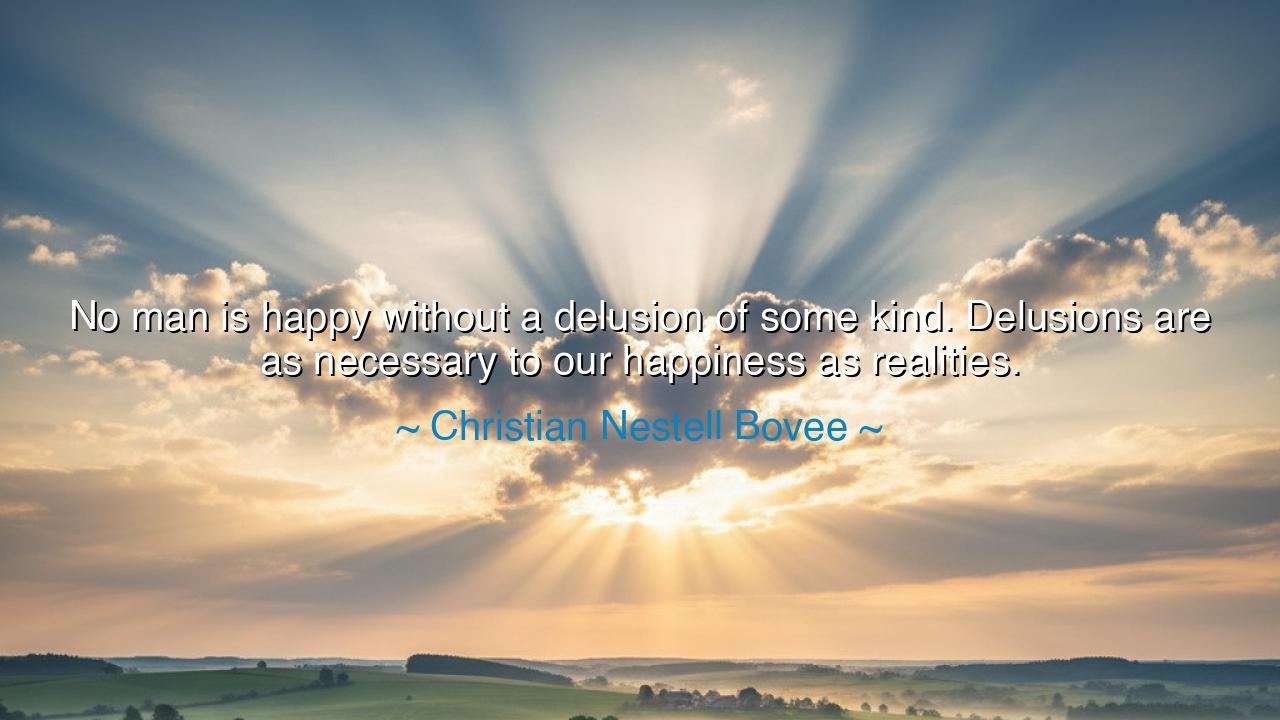
No man is happy without a delusion of some kind. Delusions are as
No man is happy without a delusion of some kind. Delusions are as necessary to our happiness as realities.






The words of Christian Nestell Bovee — “No man is happy without a delusion of some kind. Delusions are as necessary to our happiness as realities.” — glide through the chambers of the mind like a whisper both unsettling and profound. They speak not to folly, but to the mysterious alchemy of the human heart, which fashions dreams and illusions to endure the weight of truth. In these lines, Bovee reveals one of life’s subtle paradoxes: that the soul, to remain whole, must sometimes veil itself in illusion, as the eye cannot gaze too long upon the sun without blindness.
Bovee, a 19th-century philosopher and essayist, lived in an age of reason, when men worshiped intellect and clarity. Yet he saw what others missed — that reason alone cannot feed the spirit. The mind seeks truth, but the heart seeks meaning. And meaning, like warmth, is not always found in the cold precision of fact. Thus he wrote of delusions, not as lies to be despised, but as dreams to be cherished — the tender fictions that give life sweetness, purpose, and hope. For man is not a creature of knowledge alone, but of longing. He must believe in something beyond what he sees — in love that endures, in justice that prevails, in destiny that calls — even when the world gives him no proof.
To call these things “delusions” is not to insult them, but to name them honestly. They are the beautiful veils we weave around the unbearable edges of reality. Think of the soldier who marches into battle, believing his sacrifice will bring peace. Think of the lover who vows eternal affection, though time will change them both. Think of the artist who pours his soul into a canvas, convinced that beauty can defy decay. These are all, in a sense, delusions — and yet, without them, life would be a barren field. For it is through these sacred dreams that humanity rises above despair and creates what is noble and enduring.
Consider the story of Don Quixote, the noble fool of Cervantes’ immortal tale. He rode forth to battle imaginary giants, to defend ideals that the world had forgotten. To others, he was mad — but within his delusion, he found purpose, courage, and joy. His dreams of chivalry, though false to the world’s eye, were true to the spirit’s hunger. For what is madness but devotion misunderstood? Don Quixote reminds us that sometimes, the illusion of meaning sustains the soul better than the emptiness of truth. He lived not in the world as it was, but in the world as it ought to be — and in that, he was more awake than those who mocked him.
Bovee’s insight, then, is not a call to self-deception, but to balance. He warns us that pure realism, unsoftened by imagination, can turn the heart to stone. To see life only as it is — cruel, brief, uncertain — is to invite despair. Yet to live only in illusion is to drift into madness. The wise, therefore, weave both together: they see the world clearly, but choose to dream nonetheless. Like sailors who navigate by stars they know are unreachable, they find direction in what is distant but divine.
The ancients understood this harmony. The Greeks spoke of the mythos, the sacred stories that gave form to the invisible. The Buddhists speak of Maya, the great illusion of existence — yet even within illusion lies the path to enlightenment. And the poets of every age have known that truth without wonder is a barren truth, that man must believe in beauty if he is to create it. For without illusion, there would be no art, no love, no faith — only survival, stripped of its song.
Let this teaching settle into your heart: do not despise your delusions. Cherish those dreams that lift your spirit, that give meaning to toil and tenderness to sorrow. But hold them gently — do not mistake them for the whole of truth. Let your illusions be lamps, not cages. Dream, but do not drown in the dream. Hope, even when reason falters. Love, even when loss is certain. For it is through these sacred delusions that the soul learns to live fully.
And so, remember Bovee’s wisdom: happiness is not the absence of illusion, but its harmony with reality. The wise man does not extinguish the candle of imagination; he lets it burn beside the lamp of reason. Between them, life becomes bearable — even beautiful. For in the end, it is not truth alone that saves us, but the courage to believe in something beyond it.






AAdministratorAdministrator
Welcome, honored guests. Please leave a comment, we will respond soon